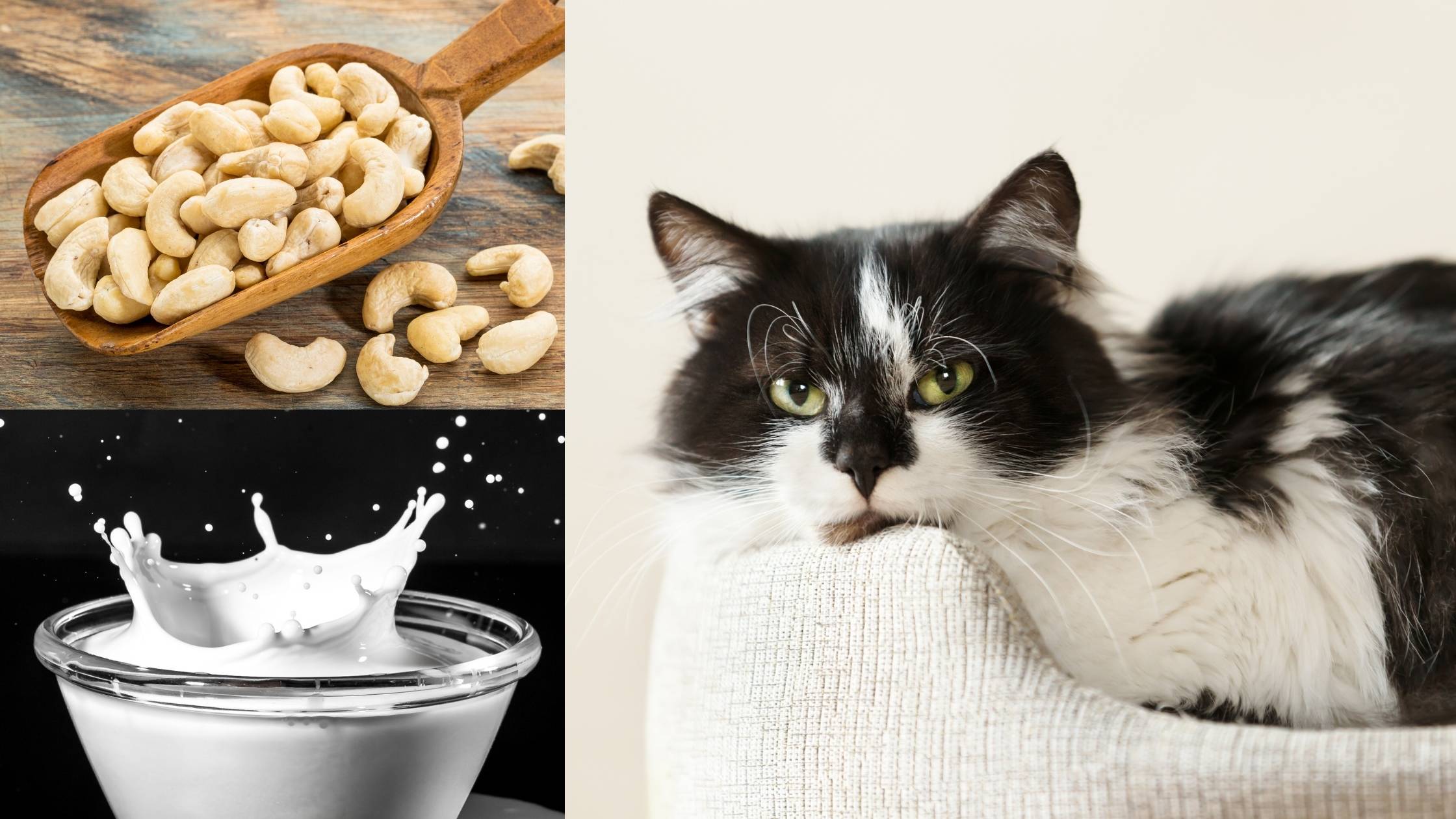Last Updated on 11/22/2021 by Veronica Jones
We love to eat cashews as snacks, and we can easily buy these in any store and supermarket. Cashew milk is also becoming increasingly popular as a dairy-free alternative. If you’re a cat owner, you might be wondering wonder if it would be safe to feed some to their beloved pets. So, can cats eat cashews? What about cashew milk? Let’s find out.
Can Cats Eat Cashews?
No, cats should not eat cashews, and it’s certainly not recommended.
One of the main factors to be considered is that your cat might choke when eating cashews. Cashews are large and irregularly shaped, so might get stuck in the throat, and we should avoid always feeding our cat choking hazards.
However, the most important reason not to feed your cat cashew nuts is that a cat’s digestive system is designed to process meat as cats are carnivores. Much like humans can be allergic to cashew nuts (or any nuts), cats are likely to be more allergic because it is in their nature to thrive on a meat-based diet.
If cats eat cashews by mistake, you should observe them carefully. They might be fine, but you should also watch for signs of choking and allergic reactions.
As an alternative, some of us might think that it will be okay to feed the feline with milk from cashew nuts. We might also wonder how much of it they can consume and how we can prepare it for them. So, can cats have cashew milk?
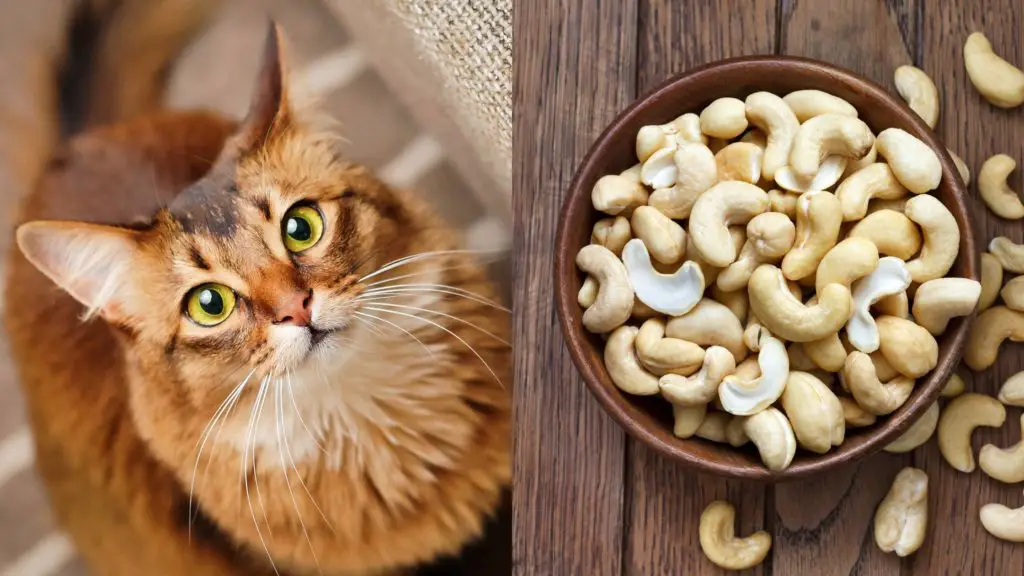
Can Cats Drink Cashew Milk?
Yes, cats can have cashew milk, but only very sparingly. It is a good alternative to dairy, as it doesn’t contain lactose. However, it is still derived from cashews, which aren’t a food that cats are naturally evolved to consume. If you do give your cat cashew milk you should watch carefully for any allergic reactions, and only give it in very small portions.
Now that we know that our feline can consume it, just how much of it is safe for their consumption?
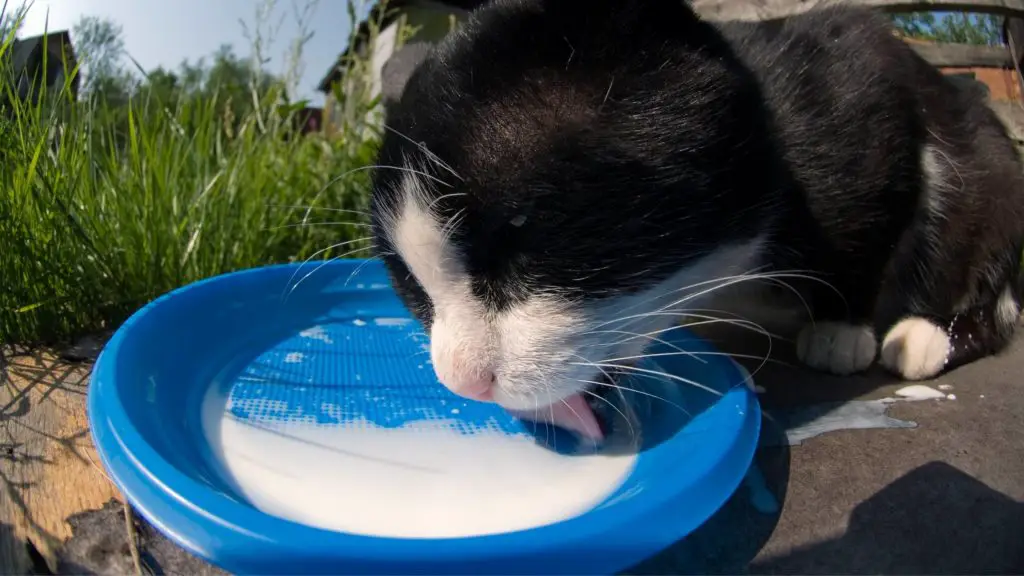
How Much Cashew Milk Can Cats Drink?
It might be a better alternative from other dairy products, but it does have downsides. Clearly, cashew milk is not something that cats have evolved to drink. We should, therefore, only give it in moderation. You should also be very careful when first giving cashew milk to your cat. Start with only a very small amount, to check that they don’t have any sort of allergic reaction to it. If, after 24 hours they seem fine, you can give it to them in relatively small amounts very occasionally.
Can Cashew Milk Kill Cats?
Drinking it will not kill the feline, but if it becomes part of its regular diet, the cat will have digestive and stomach issues. Cats’ stomachs are sensitive in breaking down nutrients, particularly if we feed them a non-meat diet.
We have to understand our cats before feeding them. We have to check whether the cat has an allergic reaction to cashew nuts. If there is no way of knowing if our pets are allergic to cashews, we should refrain from giving cashews to them.
If we insist on feeding it to our cats despite being unsure if they are allergic or not, we can observe them. Symptoms of an allergy include breathing and gastrointestinal issues, rashes, and swelling.
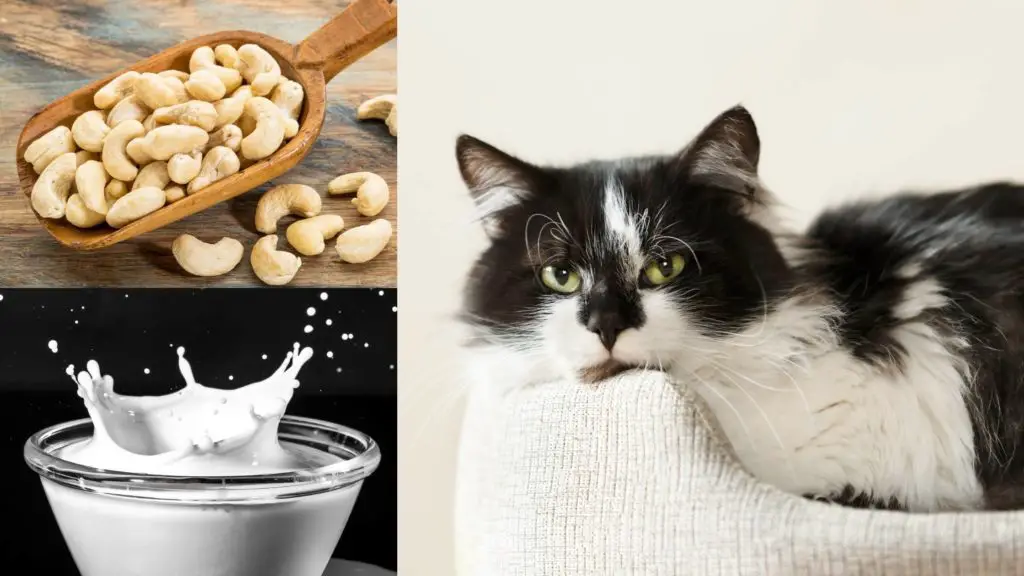
Is Cashew Milk Bad for Cats?
Cashew nuts are not toxic for cats, but their fat content can affect our cats’ diet. It has a high-fat content that will affect a cat’s digestive system. It is not a part of a cat’s typical diet and can cause obesity in the long term. If cats eat cashews, nothing bad is likely to happen in the short term, but it could impact their health on a longer-term basis.
Anything taken in excess is harmful. Cashews are high in fat and sodium, and these can be harmful to cats when consumed excessively.
How Do I Prepare Cashew Milk for My Cat?
We can feed the drink that we prepared ourselves. Soak a cup of cashew nuts overnight. Drain the liquid and rinse. We will mix the cashew nuts with 4 cups of water in a blender. Blend the mixture on high for a minute. Pour it in a storage container to refrigerate.
The homemade drink can last up to four days but is best consumed within the first two days.
Even though it doesn’t contain any lactose, it is still high in fat. Too much fat can lead to long-term health problems for the cat, so we should limit the cat’s consumption of the drink.
Any foreign food can cause a negative reaction to the cat’s health. The cat might suffer from digestion issues especially if the cat’s stomach is sensitive. It will also cause weight gain and eventually to obesity if not properly checked or monitored.
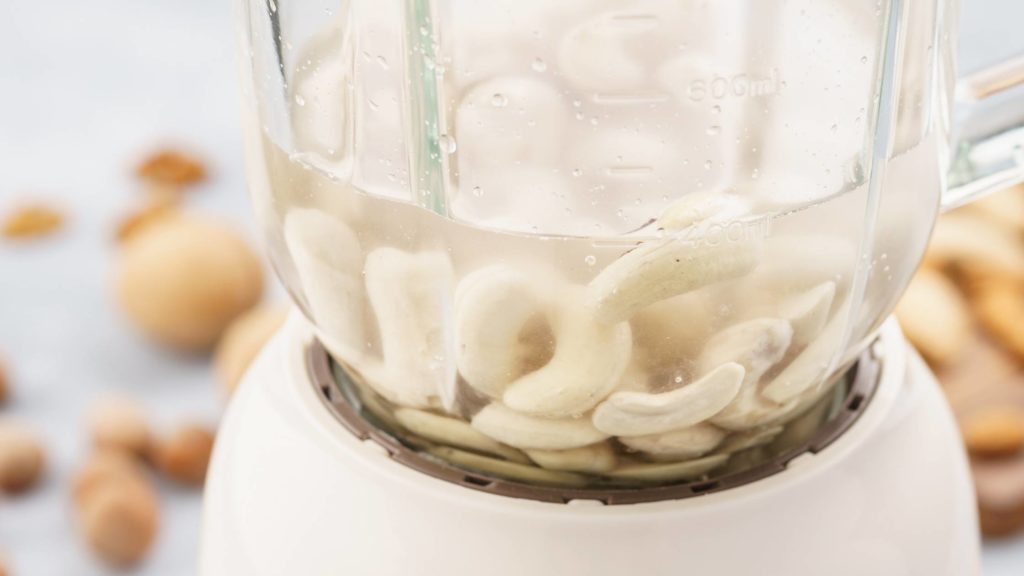
Will Cashew Milk Make My Cat Sick?
Cats rarely consume fat as part of their diet, and cashews have a high-fat content. If cats eat cashews regularly, it will eventually lead to weight gain and possibly to obesity. Obesity is a serious issue for our cats, and to avoid this problem, we should avoid giving them cashews.
Cats also have difficulty digesting cashews because they are carnivores. Feeding our cats with cashews can lead to stomach problems and might even induce vomiting.
Cashews also have high sodium content even without us adding salt for taste. Cats do not naturally consume sodium, so they have difficulty breaking it down. Consuming high amounts of sodium will lead to dehydration.
Last but not least is that cashews can cause pancreatitis in our cats. Symptoms of pancreatitis include appetite loss, fever, and lethargy. Not only will it be bad for our cats, but it will also require advanced medical treatment. It can cost a lot of money.
Can Kittens Drink Cashew Milk?
The kittens’ digestive and immune systems are not yet developed. For this reason, we should not give cashew milk to kittens. Not everything that cats can eat is safe for a kitten.
Kittens still rely on the mama cat’s milk for their growth and survival. The kittens will likely suffer from an upset stomach if we feed them with this.
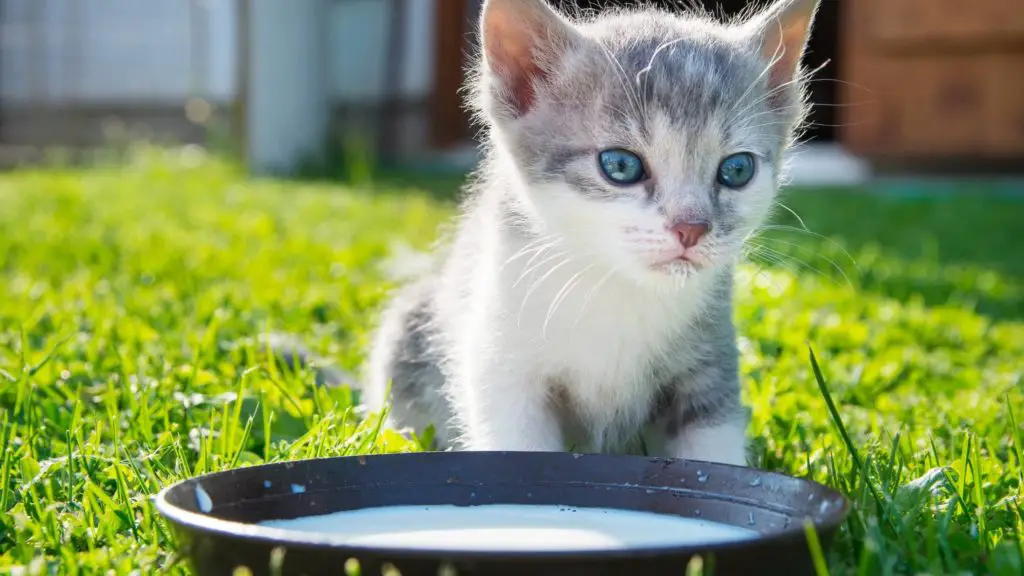
What Can I Give My Cat Instead of Cashew Milk?
Since cashew milk should not be a part of our cats’ diet, we listed other food that you can give your cat. The listed food can either be treats or regular depending on the nutritional value.
Cats are born carnivores and meat will be the perfect source of the nutritional values like protein that their bodies need. We can give cats cooked beef, chicken, and turkey. Do not give them raw or spoiled food because it can make them sick.
Whole grains could be another alternative and this is easy to prepare. We can mash barley, brown rice, couscous, millet, and wheat. Make sure that the food is prepared so that our cats can fully digest the grains.
Another great alternative is fish. It is rich in omega-3 fatty acids that can help cats stay sharp and on their toes. Omega-3 fatty acids can also help prevent arthritis, cardiovascular diseases, and kidney problems.
Tuna and mackerel are known to boost eye health, joints, and brain. Salmon is a good source of protein and is already common in commercial cat food. It is also rich in omega-3, but don’t feed cats with raw salmon.
Canned or cooked fish can be given to felines as a treat but we should never feed them raw fish like sushi.
Eggs are alternative sources of protein and are rich in vitamin B. However, we should feed only feed them cooked eggs. Raw eggs can make our felines sick.
Chicken is a good source of lean protein as long as it is cooked properly. Make sure to remove the chicken skin before feeding it to the cat. Chicken skin is fatty and can negatively affect a cat’s diet.
Vegetables, flowers, and fruits are rich in vitamins. These are also great sources of fiber that can help with the felines’ digestion. The issue with vegetables is that not all cats like them. We can feed them fresh food like asparagus, broccoli, cantaloupe, and cucumber.
We can feed our pet cat fruits but we should make sure to cut them into bite-sized and digestible pieces. We can feed chilled fruits it to our pet cat to cool down their bodies on a hot day.
Apples are high in fiber and rich in vitamin C. We can feed it to the cat as long as we remove the apple skin. Feed the cat with fresh apples and avoid giving cooked and seasoned versions of the fruit.
Bananas are healthy snacks that we can feed our felines. Just feed bananas sparingly as it has high sugar content.
Berries have low sugar and are rich in antioxidants. We can feed these to our cats but only as fresh produce. Avoid feeding them in processed forms such as pie. Blueberries are rich in vitamins A and C and many cats enjoy eating frozen blueberries. However, the fruit should be treated as a snack and should not be fed to the cat every day.
Melon and cantaloupe are not only high in antioxidants but are also rich in beta-carotene. These nutrients will help keep our cats’ skins and eyes healthy.
Pumpkin is low in calories but rich in fiber and other nutrients that will help keep our cats’ hairballs and digestive systems healthy. It is highly recommended to feed cats some pumpkin when they are suffering from abnormal stools.
Spinach has a high nutritional value and is rich in vitamins A, C, K, calcium, and iron. However, we should not feed cats some spinach if they already have a history of calcium oxalate bladder stones.
If our cats don’t like vegetables, we can try making a veggie burger for them. Let’s just make sure to not include onions or garlic when preparing the patties.
Cheese contains protein and felines can have them as a treat. Most felines cannot handle dairy well so we should only feed them cheese as a treat.

